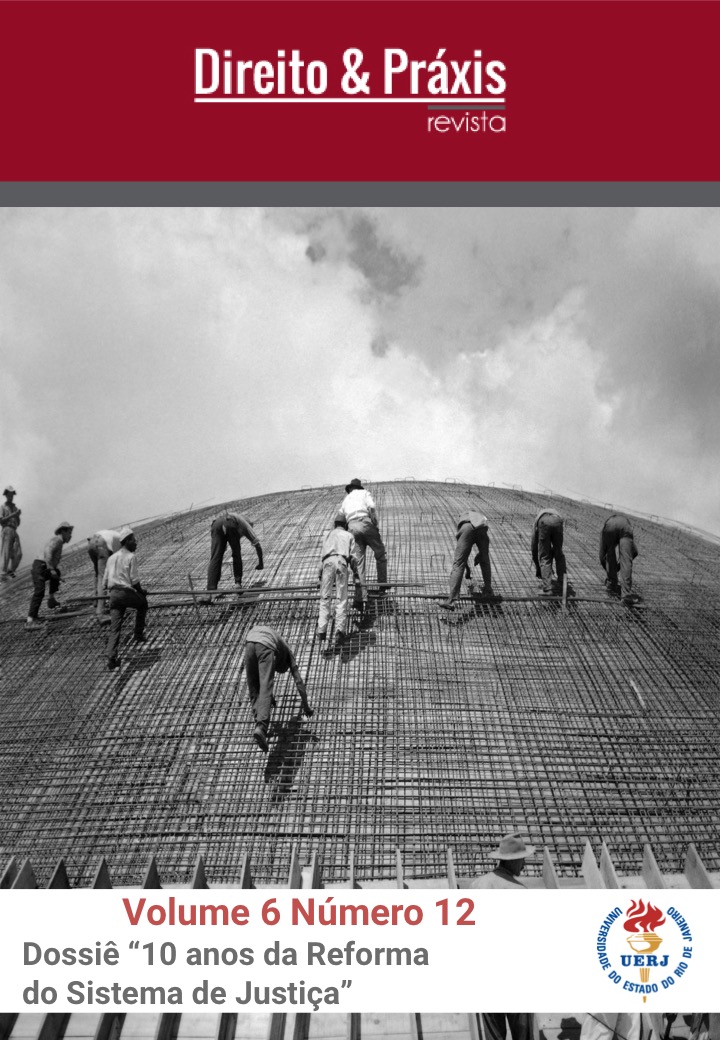Judicialização das telecomunicações no Brasil: disputas sobre direitos dos consumidores e regulação / Telecommunications services and judicialization in Brazil: between legal disputes over consumer rights and regulation
DOI:
https://doi.org/10.12957/dep.2015.17989Palavras-chave:
Judicialização – Telecomunicações – Regulação – Agência Reguladora / Judicialization – Telecommunications – Regulation – Regulatory Agency.Resumo
DOI: 10.12957/dep.2015.17989
Resumo
O artigo focaliza a judicialização das relações sociais nas telecomunicações no Brasil. A hipótese central é que a luta judicial acabou por colocar os tribunais no papel de atores do processo regulatório. Na primeira parte, é realizada uma resenha da teoria sobre o fenômeno da judicialização, para que se demonstre a possibilidade do uso de conceitos alternativos. Depois, são descritos quatro casos: as disputas sobre assinatura básica; as ações sobre o detalhamento das contas de consumo; as lutas acerca da busca de um novo índice de reajuste dos serviços; e as ações judiciais contra a definição regulatória de áreas para chamadas de longa distância. Em todos os casos analisados, o Poder Judiciário manteve as decisões da Agência Reguladora e das empresas que, não obstante tais vitórias, iniciaram processos de modificação das normas regulamentares. A conclusão do artigo é que o Judiciário foi relevante no processo de revisão da regulação em telecomunicações, pois a Agência Reguladora considerou que a insurgência precisava ser considerada e incluída nos regulamentos administrativos que sucederam as ondas judiciais. Assim, os dados coletados demonstram que a tensão abstrata entre os conceitos de deferência judicial e de ativismo moderado, quando observada empiricamente, pode se mostrar de forma bem mais complexa.
Palavras-chave.
Judicialização – Telecomunicações – Regulação – Agência Reguladora.
Abstract
The paper focuses on the judicialization of the telecommunications consumer policies in Brazil. The hypotheses is that the judicial demands of the consumers had the effect to adjudicate a regulatory role to the courts in the regulatory process. In the first part, it is produced a literature review of the theory of judicialization in order to show the possible use of alternative concepts to understand such phenomenon. The second part describes four judicial cases: the disputes against minimal fees of the fixed lines; the demands for the detailing of the charges and phone bills; the fight against the price increases and its rates; and, finally, the struggles against the long-distance system of charging. In all the cases, the courts had judicial deference to the regulatory system decisions. Otherwise, the judicial enactments had the effect to start administrative actions to change the regulation. The conclusion of the paper is that the judicial branch was important to advance the modification of the regulation since after the judicial mass-conflict in-fights the Regulatory Agency agreed to start the changes in the administrative regulation. Nevertheless, the data shows that the conceptual tension between judicial deference and moderate judicial activism, when empirically assessed, can show a higher degree of complexity.
Keywords
Judicialization – Telecommunications – Regulation – Regulatory Agency.
Downloads
Publicado
Como Citar
Edição
Seção
Licença
Os textos são de exclusiva responsabilidade de seus autores.
É permitida a reprodução total ou parcial dos artigos da Revista Direito e Práxis, desde que citada a fonte.
Este trabalho está licenciado sob uma Licença Creative Commons 4.0, Atribuição-Sem Derivações.
Esta licença permite copiar e redistribuir o material em qualquer suporte ou format para qualquer fim, mesmo que comercial, desde de que citada a autoria original.
This work is licensed under a Creative Commons Attribution 4.0 International License.




